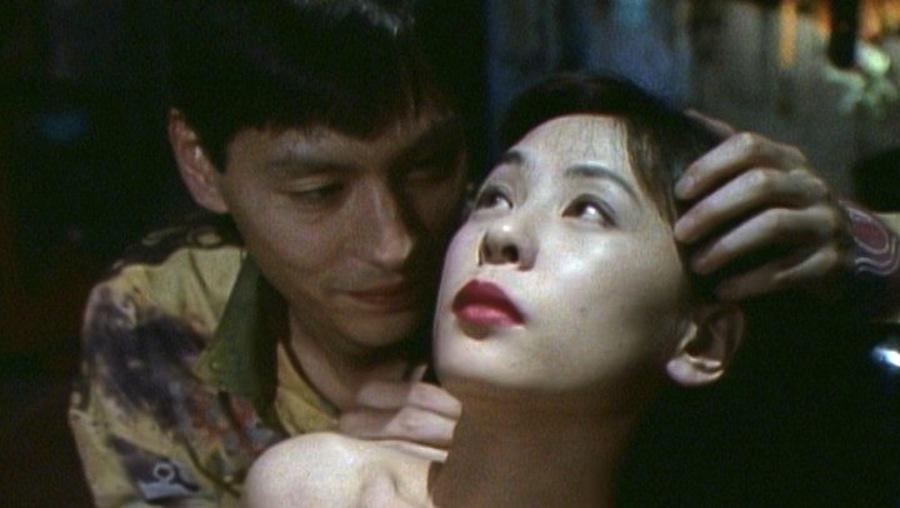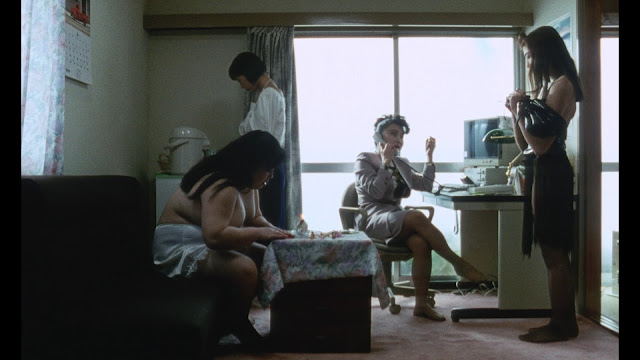
Tokyo Decadence is a 1992 Japanese drama film, directed by Ryu Murakami and starring Miho Nikaido. (All quotations are from the English subtitles.) Amazon
Ai (Japanese for “love”) is a 22-year-old professional submissive sex worker, adrift in 1990s Japan, lacking in direction.

In the very first scene, Ai is tied up and naked. Her client tells her S&M is all about trust, but then blindfolds her despite her objections. He injects her with something, also apparently without her consent. (Drug use, both giving and receiving, is a recurring motif.)
In Ai’s scenes with her clients, she is awkward and passive, as if she wandered into a stage play and doesn’t know or understand the script. Clients impress their own ideas and archetypes upon her, more like a prop in their visions. Ai’s blank-ness may actually be an asset in her line of work, having little sense of self to interfere with her client’s fantasies.

The second client Ai sees, implicitly a Yakuza gangster, asks her about herself. She says:
Ai: I’ve discovered that I have no talent whatsoever.
After a scene with the gangster and his girlfriend, Ai pulls the bondage gear off and vigorously brushes her teeth. On her way out, the gangster overpays her and says to her:
Gangster: Don’t think you’ve no talent. That’s a cop-out.
Another client wants to be strangled by Ai and another escort while receiving oral. The two women think they accidentally killed him, and are astonished when he suddenly comes back to life.
Yet another client, who initially is friendly enough, proves to be a necrophile who wants to re-enact a specific rape and murder with Ai. When he tries to strangle her, Ai finally resists. He lets her go, but demands his money back. This puts Ai on thin ice with her manager.

On a threesome assignment, Ai meets Saki, a pro-dominatrix who deftly commands their masochistic male client (and Ai too). Saki shows the kind of confidence and control Ai lacks. Saki takes Ai to her lavish home, where they hang out. Saki proves to be a serious cocaine user (she snorts, injects and smokes it).
Ai: You must be wealthy.
Saki: Not really. It’s Japan that’s wealthy. But it’s wealth without pride. It creates anxiety, which drives our men into masochism. I’ve made my living out of these men.
Saki gives Ai an unspecified drug that will allegedly give her courage. After her night with Saki, Ai goes on a journey to find her former lover who married another woman, though it’s implied he actually died.
In a post-credit scene, Ai appears on stage, dressed in a Saki-like outfit. She signs something in sign language, then dances in a far more confident way.

I wouldn’t call Ai masochistic. She doesn’t embrace her experiences, but instead seems detached, even confused. It’s different from Lucy in Sleeping Beauty (2011); Ai seems like a person who has lost her way, and looks to others for direction. She watches Saki dominating the client like a person attending a university lecture that they just don’t understand.
BDSM in Tokyo Decadence is not a means to connection or intimacy. It’s a symptom of a dysfunctional society, of men (mostly) who have too much money for their own good, paralleled by the drug use (mostly cocaine and other stimulants) and the gourmet meals. Human connection is what’s missing, and what Ai searches for.




[…] The History of BDSM, Tokyo Decadence (1992): The Celluloid Dungeon […]
[…] The History of BDSM, Tokyo Decadence (1992): The Celluloid Dungeon […]
[…] Schey Place Books – Erotic-Romance Book of the Year Future of Sex – Long Live the New Flesh: The Cronenbergs’ Take on Tomorrow’s Sexuality History of BDSM – Tokyo Decadence (1992): The Celluloid Dungeon […]
[…] The History of BDSM, Tokyo Decadence (1992): The Celluloid Dungeon […]
[…] The History of BDSM, Tokyo Decadence (1992): The Celluloid Dungeon […]